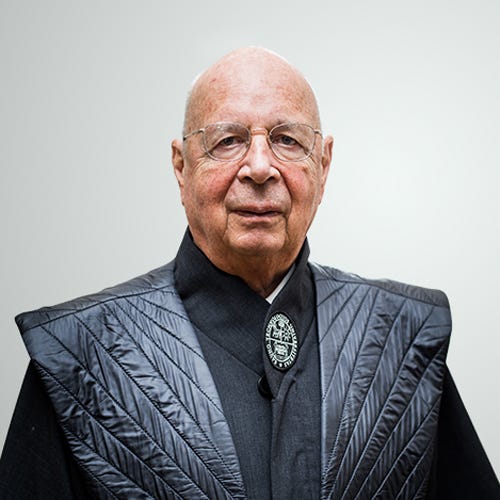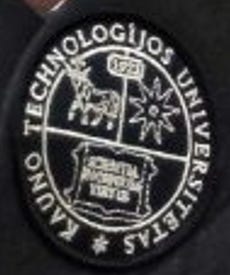The Great Reset, reconsidered

This is a picture to make one’s hackles rise. Klaus Schwab’s costume makes him look like a would-be world-dominator just asking for James Bond to take the sneer of cold command off his face.
In reality, it is the ceremonial garb worn for receiving an honorary doctorate from the Technical University in Kaunas, Lithuania. Schwab got his in 2017 and two other recipients wore the same in 2019. The badge is that of the University:

Professor Schwab notes the rise of powerful new technologies and sees his role as helping to minimise the social and economic disruption they will cause. In his 2018 essay on Britannica.com he says:
… the Fourth Industrial Revolution will be driven largely by the convergence of digital, biological, and physical innovations… [its] technologies, such as artificial intelligence, genome editing, augmented reality, robotics, and 3-D printing, are rapidly changing the way humans create, exchange, and distribute value. As occurred in the previous revolutions, this will profoundly transform institutions, industries, and individuals… this revolution could yield greater inequality, particularly in its potential to disrupt labor markets.
For over 50 years, Schwab has been exploring how to manage the changes in a humane way, through what began as his ‘European Management Forum’ and is now the WEF.
However, our instinctive distrust of such power nexuses is reasonable, for even a benevolent venture may be perverted. An institution may be set up to embody a function - what Marx called ‘reification’ - but can stray far from its initial purpose; for recent examples, consider the NHS, the universities and the social media.
For a political example, think of the European Union, rooted in the heroic lifetime’s work of Jean Monnet, who wanted to put an end to the lethal historic rivalry of France and Germany. Yet by the time of the Treaty of Rome in 1957 that danger was ended, not only because of the horrors and resource exhaustion of WWII but also with the advent of nuclear and other weapons of mass destruction. Still, the EEC offered the opportunity to create a trading cartel that would support its citizens against the damaging commercial competition of the developing world. That protection evaporated with the recruitment of lower-wage European countries following the collapse of the Soviet Union; and now the EU has become involved in NATO’s/USA’s proxy war in Ukraine against non-Communist Russia. We have come all the way from the promotion of peace between nations to fomenting military conflict and even risking nuclear war.
Similarly, the sort of ‘social entrepreneurship’ promoted by the Schwab Foundation is open to exploitation. Everyone is familiar with the young eco activist Greta Thunberg and her emotional diatribes at the United Nations, Davos and the WEF itself; but if the work of another Green, journalist Cory Morningstar, is right, Thunberg is the figurehead for an ostensibly charitable movement that battens on the idealism of the young. Morningstar’s analysis is headed by a quote from the artist Hiroyuki Hamada:
What’s infuriating about manipulations by the Non Profit Industrial Complex is that they harvest the goodwill of the people, especially young people… Those organizations and their projects which operate under false slogans of humanity in order to prop up the hierarchy of money and violence are fast becoming some of the most crucial elements of the invisible cage of corporatism, colonialism and militarism.
The WEF may be born in goodwill, but where could its networking and power-broking lead us?
After the Second World War many people hoped for a world government, one that would end international strife; but human nature could easily turn it into a vast tyranny without any rivals to offer the hope of escape. First the ends would justify the means, however oppressive; then the original ends would be forgotten.
It would be safer to work endlessly on restraining the means of power in all its forms: financial, military, political, legal and ideological.
In a word, liberty.



